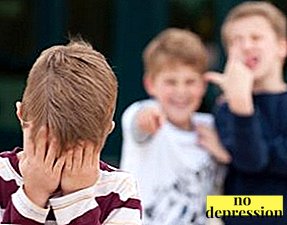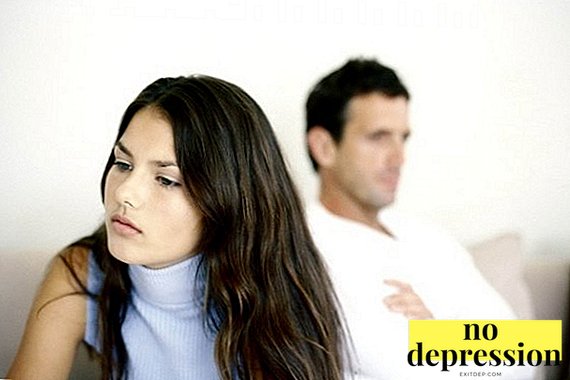Parents of preschoolers and even schoolchildren often have a question about how to teach a child to stand up for himself.
How to do it, psychologists will tell.
Psychology and causes

Why can't a child give back?
Adults often without realizing it, form in the child various complexes and fears.
Trying to bring up correctness and politeness in the kid, we sometimes forget about the fact that you need to be able to stand up for yourself.
Mom says: to fight badly, and, assimilating it, the child cannot give up.
Example. A child in a sandbox trying to take away a toy. The kid resists, not wanting to give her own, but the grandmother says: Give it back, are you sorry? With each such situation, the child learns that it is not necessary to fight for his own. It seems that adults would like the best, but it turned out the opposite.
Another example. The parents of the baby are very despotic, the child is raised in harsh conditions. He is not allowed to express his own opinion, he is constantly criticized, belittled.
As a result, low self-esteem is brought up. A child is afraid of being strong not only in front of adults, but also with his peers. Fear of punishment brings him a sense of insecurity.
If the baby is in nature has a weak nervous system, health problems, it is more difficult for him to cope with the difficulties of the external world. Excessive custody exacerbates the problem.

Adults want to protect from difficulties, but in fact do not allow the child to learn how to cope with external influences, difficult situations.
Arises problem avoidance reaction.
When a child is hurt by peers, the first reaction of the mother is to save him. But in fact, he is quite able to stand up for himself.
And if adults always protect him, it may cause ridicule from other children, which also beats the child’s self-esteem. Proper education - A whole science, and parents should carefully choose methods of exposure.
Criticism and accusations by parents also negatively affect the child’s self-esteem.
He was defeated in a fight - instead of supporting and telling how to act correctly, parents swear - a coward, a weakling, thereby provoking the formation of self-doubt and the feeling that he is not capable of anything.
For young children, parents are the authority, and everything they say is true, therefore, positive statements towards children are so important.
What if the baby is not able to stand up for himself?

To start you can not blame him.
If a child has low self-esteem, it is necessary to find a way to increase his self-confidence.
Criticism and accusations will lead to the opposite result - the baby will become even weaker, a lot of complexes and fears will appear, he will avoid conflicts and will not be able to protect himself.
However, it does not at all mean that it is imperative to teach everyone to throw at the offender with his fists, without understanding the situation. If the child is still small, it is useful for him to develop the skills of self-control.
The task of the parents is to cultivate a strong, self-sufficient person capable of distinguishing an attack without a cause and a forced defense.
Children incredibly receptive to what they are inspired. Therefore, parents have to be careful with the methods of education.
It is difficult to stand up for children uncommunicative, so it is important to pay attention to proper socialization. If a child does not go to kindergarten, take him to development groups, groups where he will contact other children, learn cooperation.
In some groups arises unhealthy environment. This is due to the fact that adults do not pay enough attention to establishing a favorable atmosphere within the group.

In this case, the right decision can be transfer of a child to another institution.
Choose a garden that takes into account the individuality of children, where each child is searched for an individual approach.
If he sits alone in a corner and does not play, competent educators find the cause and do everything to preschoolers included in the team and learned to communicate with peers.
Often, aggressive behavior is provoked by the parents themselves. In each group there is a child with a problem education.
Pay attention of the educator and psychologist to his behavior, let them discuss it with his parents.
How to teach the child to give change?
What to do if your son or daughter is attacked, but he does not respond:
- Instill self-awareness of a full-fledged person. The child must understand that he is strong and cannot be offended.
- Teach him protect your interests: when he is insulted; try to beat, pinch, have any physical impact; when things belonging to him are taken away; in cases where they insult parents and family; humiliate; forced to do what he does not want; trying to incite to unlawful acts.
- Discuss problems with the abuser with your child: for what reason a particular situation occurs, how children behave, what they say, why he is afraid of giving back. Tell how to do it correctly, how to count your strength so as not to cause significant harm, but at the same time stay in the win.
- Will be useful self defense training.
- Find out, Does the child provoke a quarrel?. Perhaps the stronger offenders themselves were forced to defend themselves.
- There must be a rule - you can not take other people's things without permission and at the same time not allow someone to take your things without your consent.

Be sure to talk to the tutor. Find out why the peer exposure is allowed.
If you change your garden or school, and the persecution continues, it means that the child is not in the environment.
Watch how he communicates with peers. Ask the teachers about his behavior, how he provokes the other guys. Spend a conversation with him, pay attention to how he behaves and that it is his behavior that provokes conflicts.

Children with victim complex noticeable, usually immediately.
They have lowered shoulders and head, as if they want to hide, they try to look away, because they do not like eye contact.
Their voice is quiet, monotonous, speech is unsure, it is difficult for them to immediately respond to the phrases addressed to them. They can cry, run away, complain to teachers. If you see a child showing signs of a victim, start working on his behavior.
Important: no criticism, accusations, ridicule. Parents should do everything possible to increase self-esteem.
Suggest the child to straighten his shoulders, notice that in such a state he feels stronger. Find him a hobby that will help him gain confidence and increase self-esteem because of their achievements.
Parental support is important. Children who are brought up in an authoritarian style cannot solve anything on their own. They have such personality traits as depression, lack of initiative, hostility, lack of self-control.
Infantilism, dependence, uncertainty, passivity become a consequence of hyper-care. That is why parents should pay attention to what methods of education and influence they use.
Psychological advice to parents

How to teach a child to stand up for themselves in school?
Since childhood need to teach a child to be a leader. This does not mean that all issues are resolved by fists.
The leader is able to turn the situation in his direction, using only words. But if it comes to physical exposure, the child should be able to stand up for yourself.
- Teach your child to be objective - be able to assess the situation and choose - whether to apply a physical impact in response to insults.
- Teach not to be a victim. The student is quite able to understand what the psychology of the victim is.
- Note that children copy parental behavior., including in resolving controversial issues.
Become a positive example for your son or daughter, teach not to leave the conflict and hide, but to solve it in your favor.
- If a child is physically weak, they beat him, he loses in fights, Take him to the sports section. Sport itself increases self-esteem, and exercise will improve physical fitness.
- Learn the ability to refuse. Explain to the child that he is not obliged to agree to all peer offers. If he does not want to do something, they have no right to force him. This is especially important so that the student does not fall into the unreliable company with criminal tendencies.
- Develop positive self-esteem contribute to various hobbies. A child feels like a person when he has a hobby. Teach him to defend their interests and hobbies, not to be afraid of the opinions of others.
- Exercise with him in witLet the student learn to respond and respond in difficult situations. Conduct classes in the form of a game, organize competitions with other children.
- Raise faith in yourself in a child. Forget the phrases: you will fail, you are mistaken, you are stupid, you study poorly. They should not be in your family. Instead, say: you are strong, you can do it, I believe in you, see how good you are.
- Looking for good friends. Hold a conversation with the child, what is friendship, how to choose friends, for which they should be valued, how to avoid negative personalities and why you should not communicate with them.
Teach the student to understand people, evaluate their positive and negative qualities.
- Do not respond to attempts to humiliate and not make excuses. If a child has a name, let him simply ignore it, after a while the children will forget. If he begins to make excuses, then the nickname may remain with them for a long time.
- Do not show fear. Other children feel great when they are afraid. Fear is the basic instinct, it forces to run and attack those who are afraid.


Remember that most childhood problems comes from family.
Pay attention to the methods of exposure, family relations, and you will understand why a child develops low self-esteem.
If you can not cope on their own, consult a psychologist.
How to teach a child to give change? Find out from the video:



